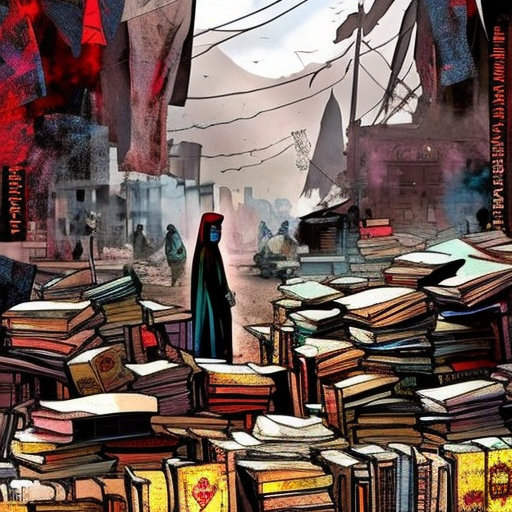One-line Summary:
“The Bookseller of Kabul” is a captivating non-fiction book that provides a vivid and intimate portrayal of life in Afghanistan through the eyes of a bookseller and his family.
Life in Kabul
“The Bookseller of Kabul” by Asne Seierstad takes readers on a captivating journey through the bustling streets of Kabul, providing a unique glimpse into the lives of its inhabitants. The book centers around the life of Sultan Khan, a bookseller who has dedicated his life to preserving and selling books despite the challenges posed by war and political unrest. Through Khan’s story, Seierstad paints a vivid picture of the daily struggles, hopes, and dreams of the people of Kabul.
In the midst of the chaos and destruction caused by war, Sultan Khan’s bookstore becomes a sanctuary for those seeking solace and knowledge. The author describes the bookstore as a place where people from all walks of life gather to discuss literature, politics, and religion. It becomes a symbol of resilience and a testament to the power of books in a society torn apart by conflict.
A Glimpse into Afghan Culture
Seierstad delves deep into Afghan culture, shedding light on the traditions, customs, and societal norms that shape the lives of its people. Through her meticulous observations, she explores the complexities of gender roles, family dynamics, and the impact of strict religious practices on individuals.
The author introduces readers to Sultan Khan’s family, providing an intimate look into their lives. From Sultan’s two wives, Sharifa and Sonya, to his children and extended family, Seierstad portrays the challenges faced by women in a patriarchal society. She explores the tensions between tradition and modernity, as well as the desire for personal freedom and self-expression.
The Struggle for Freedom
“The Bookseller of Kabul” also delves into the political landscape of Afghanistan, highlighting the struggles faced by its people under the Taliban regime. Seierstad exposes the oppressive nature of the Taliban’s rule, where censorship, fear, and violence are prevalent. She recounts the stories of individuals who risk their lives to fight for freedom, often at great personal cost.
Despite the hardships faced by Sultan Khan and his family, they remain resilient and determined to hold onto their dreams. The book explores themes of hope, resilience, and the power of education in the face of adversity. It serves as a reminder of the importance of preserving culture and knowledge, even in the most challenging circumstances.
Key Takeaways:
- The power of books and education to provide solace and hope in times of turmoil.
- The complexities of Afghan culture, including gender roles and the impact of strict religious practices.
- The struggles faced by individuals under oppressive regimes and their resilience in the face of adversity.
“The Bookseller of Kabul” offers a poignant and thought-provoking exploration of the human spirit, the power of literature, and the resilience of individuals in the face of adversity.
In conclusion, “The Bookseller of Kabul” offers a captivating and intimate portrayal of life in Afghanistan, shedding light on the struggles and triumphs of its people. Through the lens of Sultan Khan and his family, readers gain a deeper understanding of Afghan culture, the impact of war and political unrest, and the power of books to inspire and transform lives. Seierstad’s vivid storytelling and meticulous observations make this book a must-read for anyone interested in gaining a deeper understanding of Afghanistan and its people.












